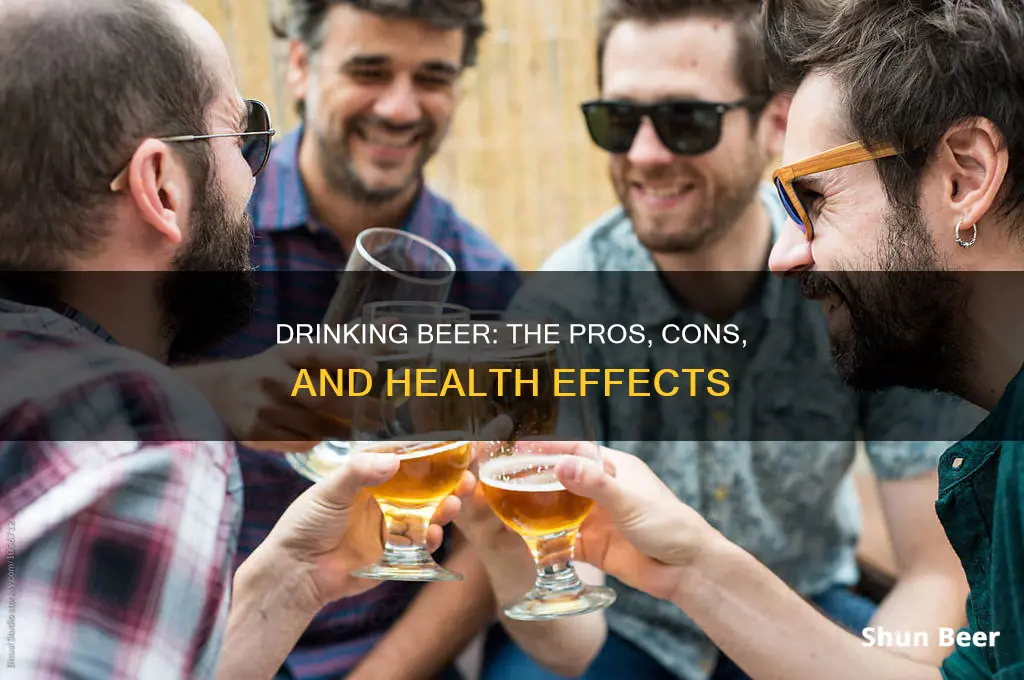
Beer is one of the most widely consumed alcoholic drinks in the world. It is made by fermenting sugars from starches, with barley, hops, water, and yeast as its major components. Beer can be alcoholic or non-alcoholic, with typical American alcoholic beers averaging 4% to 5% alcohol by volume.
Beer is distributed in bottles and cans and is also available on draught in pubs and bars. It is often served chilled, in glasses, mugs, or cans. The ideal temperature for serving beer ranges from 7°C to 15.5°C, depending on the type of beer.
Beer is considered to have several health benefits when consumed in moderation. It is a source of minerals such as magnesium, potassium, selenium, and B vitamins. It has been linked to improved bone density and gut health, and reduced risk of heart disease, type 2 diabetes, and certain cancers. However, excessive drinking can disrupt sleep, slow down weight loss, cause digestive issues, dehydration, and increase the risk of chronic diseases.
Beer is an integral part of many cultures and is often associated with social traditions such as beer festivals, pub crawling, and pub games. It is believed to have been around for thousands of years, with some of the earliest writings referring to its production and distribution.
What You'll Learn

Beer and heart health
Beer is a drink made by fermenting sugars from starches. Its major components are barley, hops, water, and yeast. It can be alcoholic or non-alcoholic. While there is no good scientific evidence, people use beer to prevent heart disease and stroke. However, moderate drinking of alcohol, including beer, has been linked to a reduced risk of developing heart disease in otherwise healthy people.
Moderate drinking is defined as an average of one drink per day for women and one or two for men. A drink is 12 ounces of beer, 4 ounces of wine, or 1.5 ounces of 80-proof spirits.
Some people should avoid even that much and not drink at all if they have certain heart rhythm abnormalities or have heart failure.
Excessive Drinking and Heart Disease
Heavy drinking is linked to a number of poor health outcomes, including heart conditions. Excessive alcohol intake can lead to high blood pressure, heart failure, or stroke. It can also contribute to cardiomyopathy, a disorder that affects the heart muscle.
Alcohol can also contribute to obesity and the long list of health problems that can go along with it. Alcohol is a source of excess calories and a cause of weight gain that can be harmful in the long term.
Beer and Weight Gain
Neither traditional nor non-alcoholic beer induced any weight gain in a study of 36 subjects with overweight or obesity class-1.
Beer and Lipid Profile
Mean serum concentrations of total cholesterol, non-HDL cholesterol, LDL cholesterol, HDL cholesterol, VLDL cholesterol, and triglycerides did not show any significant change after intervention with traditional beer or non-alcoholic beer. Interestingly, levels of HDL cholesterol and total cholesterol were significantly increased after intervention with traditional beer in the subgroup of subjects with LDL cholesterol levels below 130 mg/dL.
Beer and LDL Susceptibility to Oxidation
Sixty-one percent of the participants showed lower susceptibility of LDL to oxidation after a four-week intervention with traditional beer.
Beer and HDL Antioxidant Capacity
After a four-week intake of both types of beer, HDL exhibited higher antioxidant effects than control baseline HDL.
Beer and HDL Cholesterol Efflux Capacity
There was a statistically significant increase in the capacity of apoB-depleted serum to induce cholesterol efflux from macrophages in vitro after intervention with traditional beer.
Beer and Inflammatory Markers
Regular intake of traditional or non-alcoholic beer did not induce any increase in systemic inflammatory markers such as CRP, IL6, and TNF alpha.
Beer and Vascular Endothelial Function
Four-week intervention with traditional or non-alcoholic beer did not induce any statistically significant effect on the RHI level. Twenty-four subjects who showed endothelial dysfunction at entry had a statistically significant improvement in endothelial function after non-alcoholic beer intake.
Beer and Arterial Stiffness
Four-week intervention with traditional or non-alcoholic beer did not lead to impairment in AI@75 values.
Beer Consumption and Cardiovascular Risk Score
The Framingham risk score was not increased after daily intake of non-alcoholic or traditional beer during an eight-week period.
Ginger Beer and Dogs: Is It Safe to Share?
You may want to see also

Beer and bone density
Beer is a drink made by fermenting sugars from starches. Barley, hops, water, and yeast are its major components. It can be alcoholic or non-alcoholic.
There is some evidence to suggest that moderate alcohol consumption may be beneficial to bone health in men and postmenopausal women. However, the benefits appear most clearly from beer and wine intake, which suggests that factors in addition to ethanol may exert protective effects.
A study published in the American Journal of Clinical Nutrition in 2009 found that men who consumed one to two drinks of beer or alcohol daily had higher bone mineral density than non-drinking men. Postmenopausal women who consumed one to two drinks per day had a higher bone mineral density in the spine and hip area than non-drinking women. The authors concluded that the "tendency toward stronger associations between [bone density] and beer or wine, relative to liquor, suggests that constituents other than ethanol may contribute to bone health."
Another study published in the American Journal of Medicine in 2008 found that people who consume about one alcoholic drink a day had a lower risk of hip fractures than abstainers.
However, the research on alcohol and osteoporosis risk is largely observational and cannot conclude cause and effect. More recent studies have challenged the idea that drinking alcohol is "good" for bone health. For example, an analysis of six studies published in the journal Drug and Alcohol Dependence in 2019 found a positive relationship between alcohol consumption and osteoporosis—in other words, that alcohol was linked with greater odds of osteoporosis.
Heavy drinking negatively impacts bone health because it affects nutrient absorption. Alcohol consumption impacts how the body absorbs calcium and vitamin D, both of which are critical for healthy bone development. When alcohol disrupts vitamin D and its ability to help the body absorb calcium, it impacts the body's ability to build strong bones and overall bone density, putting people at a higher risk for fractures after falls.
Chronic heavy drinking can also cause hormone deficiencies in men and women. Men with alcoholism may produce less testosterone, a hormone linked to the production of osteoblasts (cells that stimulate bone formation). In women, overconsumption of alcohol can decrease estrogen, which can negatively impact bone density. Estrogen can inhibit bone breakdown and may stimulate bone formation. That's why a decrease in estrogen during menopause is associated with bone loss.
While some studies suggest that moderate alcohol consumption may have beneficial effects on bone health, particularly in men and postmenopausal women, the research is mixed and largely observational. Heavy drinking is consistently linked to negative effects on bone health. Therefore, while the occasional consumption of alcohol is likely safe even if you're at risk for osteoporosis or have low bone density, it's important to drink in moderation and prioritize a well-balanced diet and healthy lifestyle overall.
Germans and Beer: Breakfast Beverage or Cultural Myth?
You may want to see also

Beer and diabetes
People with diabetes do not need to cut alcohol out of their diet. However, there are some safety considerations for people with diabetes. Alcohol can affect your blood sugar levels, increase your appetite, and reduce your medication's effectiveness.
How Alcohol Affects Blood Sugar
The liver is the organ that stores and releases glucose (sugar) into your bloodstream. When you drink alcohol, the liver has a difficult time doing both of these jobs at the same time. It ends up breaking down alcohol instead of releasing glucose regularly, which can cause your blood sugar levels to drop too low. This is even more likely to happen when you drink without eating any food.
How Alcohol Affects Your Appetite and Weight
Alcohol stimulates your appetite and may affect your judgment, which may cause you to overeat and disrupt your blood sugar control. Alcoholic drinks often have a lot of calories, making it more difficult to lose excess weight.
Alcohol and Diabetes Medication
Alcohol can interfere with the positive effects of oral diabetes medicines or insulin. This is because alcohol can keep your liver from turning proteins and fats into carbohydrates when your body needs energy.
If you have diabetes, it may be best to avoid drinking alcohol. If you'd like to have the occasional drink, talk to your doctor first. They can tell you if alcohol might interfere with your medications or cause other health issues.
If you have diabetes, you should drink in moderation. Do not drink more than two drinks of alcohol in a day if you are a man or one drink if you are a woman.
Tips for Drinking Alcohol with Diabetes
- Drink alcohol only with food, and make sure to include some carbs.
- Mix liquor with low-calorie options such as water, club soda, or diet soft drinks.
- Wear a medical alert piece of jewellery that says you have diabetes.
- Monitor your blood sugar levels before, during, and after drinking.
- Make sure to have a carbohydrate source, such as glucose tablets, with you when you are drinking.
Beer and Xarelto: Is It Safe to Drink?
You may want to see also

Beer and mental health
You may feel like alcohol is your coping mechanism: a way to deal with depression, stress, anxiety, or other difficult feelings. You might be nervous about what life would be like if you stopped drinking or cut back. But relying on alcohol to manage your mental well-being can become a problem in itself.
Alcohol is a depressant, which can disrupt the balance of neurotransmitters (chemical messengers) in your brain and affect your feelings, thoughts, and behaviour. It affects the part of your brain that controls inhibition, so you may feel relaxed, less anxious, and more confident after a drink. But these effects quickly wear off. The chemical changes in your brain can soon lead to more negative feelings, such as anger, depression, or anxiety, regardless of your mood.
Alcohol also slows down how your brain processes information, making it harder to work out what you’re really feeling and the possible consequences of your actions. In the long term, alcohol uses up and reduces the number of neurotransmitters in our brains, but we need a certain level to ward off anxiety and depression. This can make you want to drink more to relieve these difficult feelings – which can start a cycle of dependence.
Research shows that people who drink alcohol are more likely to develop mental health problems. It’s also true that people with severe mental illness are more likely to have alcohol problems. This may be because they ‘self-medicate’, meaning they drink to deal with difficult feelings or symptoms.
Regular heavy drinking is linked to symptoms of depression. People with depression who drink alcohol often start to feel better within the first few weeks of stopping drinking. If you try this and feel better, it’s likely the alcohol was causing your depression. If your symptoms of depression continue, speak to your GP for help.
It’s generally not recommended to drink if you’re taking antidepressants. Alcohol can make depression worse and increase the side effects of some antidepressants. If you’re trying to cut down or stop drinking, research shows some antidepressants can increase your risk of relapsing.
If you experience anxiety, alcohol can give you a very short-lived feeling of relaxation – but this quickly disappears. If you rely on alcohol to cover your anxiety, you may soon find yourself drinking more and more to relax. Over time, this can lead to alcohol dependence. You may also find a hangover makes your anxiety worse.
If you use alcohol to unwind, think about other ways you can find to relax: meditation, yoga, exercise, or making time for things you enjoy, for example.
It’s possible to experience psychosis if you regularly drink a lot of alcohol or if you’re a heavy drinker and suddenly stop drinking. Because alcohol can make you lose your inhibitions and act more impulsively, it may lead to actions such as self-harm or suicide. Heavy drinking is also linked to suicidal thoughts and attempts.
The government advises that both men and women should not regularly drink more than 14 units a week. This is the equivalent of six pints of average-strength beer or six medium glasses of wine. If you regularly drink as much of this, it’s best to spread it over three or more days.
If you’re worried about drinking or feel it’s affecting your mental health, a lot of help is available. Talk to your GP. It might feel difficult, but they will have heard from many other people going through something similar and will want to help you. They can check your physical health and put you in touch with local support, such as local NHS alcohol addiction support services. You can also ask about other support groups or talking therapies to help you.
If you’re physically dependent on alcohol and need to stop drinking completely, stopping suddenly could be harmful. Your GP can give you advice and/or medication to help you do this safely.
If you have a severe mental health problem and a drinking problem, you may be given a ‘dual diagnosis’. If so, mental health services should be in charge of your treatment, rather than drug and alcohol services.
If you want to cut down on your drinking, avoid situations where you’re tempted to drink. If you usually socialise in the pub, think about other activities you could enjoy with friends: going to the cinema, doing an activity together, or trying an evening class. Changing your habits can be tough. Talking to people you trust about your plans may help you change. They can encourage you along the way and keep you company if you’re using exercise or other tactics to help you cope.
The effects of moderate beer consumption on mental health are still being studied. One study found that occasional and moderate beer drinkers were associated with better mental and self-perceived health and social support, and were less likely to report mild or severe physical limitations. In contrast, former drinkers were associated with worse indicators of self-perceived health, physical health, mental health, and social support than abstainers.
Drinking Beer While Driving in Mexico: What's the Law?
You may want to see also

Beer and kidney health
Beer is a drink made by fermenting sugars from starches. Barley, hops, water, and yeast are its major components. It can be alcoholic or non-alcoholic. Alcoholic beers average 4% to 5% alcohol by volume, but some can be much higher. Beer contains minerals such as magnesium, potassium, selenium, and B vitamins. It can also contain antioxidants from hops.
Beer can have both positive and negative effects on kidney health, depending on the amount consumed and individual circumstances. Here are some key points to consider:
- Kidney Function: Alcohol is considered a toxin that the kidneys must filter from the body. Excessive alcohol consumption can weaken or damage the kidneys, impairing their ability to filter blood properly.
- Dehydration: Alcohol has a diuretic effect, causing increased urination and dehydration. Dehydration can further strain the kidneys and increase the risk of kidney stones.
- Blood Pressure: Drinking alcohol excessively can increase blood pressure, and chronic high blood pressure is a major risk factor for kidney disease.
- Medications: Alcohol can interfere with the effectiveness of certain medications, including those for hypertension and diabetes, which are common conditions associated with kidney disease.
- Blood Sugar: For people with type 2 diabetes, excessive alcohol consumption can cause a dangerous drop in blood sugar levels, especially when consumed on an empty stomach.
- Weight Gain: Prolonged beer intake can contribute to weight gain, and obesity is a risk factor for kidney stones and other kidney-related issues.
- Uric Acid: Beer consumption can increase uric acid levels in the body, which is associated with the formation of uric acid crystals in the kidneys, potentially leading to kidney stones.
- Liver Function: Excessive alcohol consumption can damage the liver, which works alongside the kidneys to filter and process toxins.
In summary, while moderate alcohol consumption may have some potential health benefits, excessive drinking can have adverse effects on kidney health and increase the risk of kidney disease and related complications. It is important for individuals to drink in moderation and consult with their doctor or renal dietitian to understand their specific risks and guidelines.
Beer: Kidney Stone Remedy or Myth?
You may want to see also
Frequently asked questions
According to the federal government’s Dietary Guidelines for Americans, moderate consumption is encouraged. This means up to one drink per day for women and up to two drinks per day for men. Excessive drinking is defined as four or more drinks for women and five or more for men in a two-hour period (binge drinking) or eight or more drinks for women and 15 or more for men in a week (heavy drinking).
Alcohol consumption and abuse can cause conflict at home and in relationships, as well as financial and health problems. If you’re drinking too much, you might not be able to perform to your normal standards at work or at home. Even if you haven’t experienced dramatic effects, your alcohol consumption could be hurting your body. Alcohol increases your risk for heart disease and many cancers, including breast cancer, and it impairs restful sleep.
Stouts and porters originated in 18th-century England, where stouts were known as "stout porters" or a stronger version of a porter. Today, most would argue that the true difference is in the recipe: porters use standard malted barley, whereas stouts use mostly unmaltated roasted barley, which gives them their characteristic dark coffee flavors.
Pale ales form a kind of umbrella group that includes many subset styles, such as Belgian, English, and American pale ales. IPA stands for Indian Pale Ale, which is a type of pale ale. IPAs are typically hoppier and have higher alcohol levels than other pale ales.
Blacking out is when someone is still conscious and engaging in activities but has no memory of it afterward. Drinking large amounts of alcohol or drinking rapidly can anesthetize the part of the brain in charge of short-term memory. Regular blackouts can lead to long-term learning and memory loss in a developing brain (under the age of 24).







